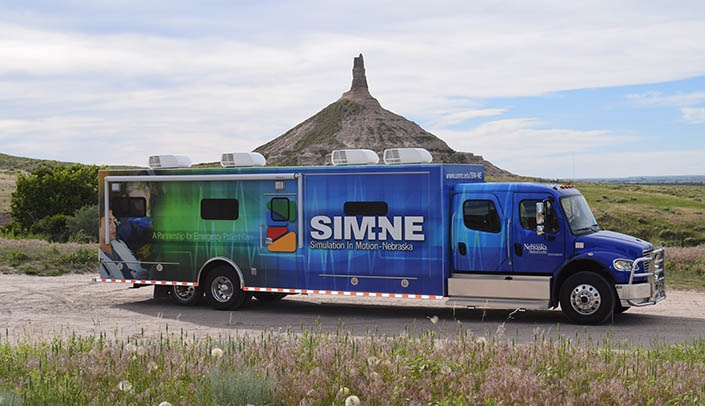UNMC has long focused on serving the medical education and training needs of rural Nebraskans.
Last Friday, UNMC College of Medicine leaders highlighted the university’s efforts to combat workforce shortages and boost access to health care training.
“As a university, we’ve engaged with experts in rural Nebraska and worked hard to alleviate the health care challenges in every corner of the state,” Bradley Britigan, M.D., dean of the UNMC College of Medicine, told members of the Academic Affairs Committee of the University of Nebraska Board of Regents. “We’ve had successes, but we also know workforce shortages, access to specialists and training issues remain. We are committed to working with rural communities to resolve these and other health care challenges.”
According to the February 2018 Annual Manpower Survey by the Nebraska Area Health Education Program, there are 253 physicians per 100,000 people-an 11 percent increase over the prior 10 years. Still, 13 out of 93 counties do not have any primary care physician and all counties — except Douglas and Lancaster — have been designated by the state of Nebraska to be shortage areas for at least one type of primary care specialty.
To combat the shortage, Dr. Britigan said UNMC is working to enhance its existing pipeline programs and educational initiatives, which incentivize health professionals to practice in rural communities, and further support telehealth adoption and use in rural areas.
“The best predictors of who will practice in rural Nebraska are individuals with experience and family in rural Nebraska, and those who complete their residency or fellowship training within a 50- to 100-mile radius,” Dr. Britigan said, noting 55 percent of physicians practicing in Nebraska completed some of their training at UNMC, whether it was medical school, residency and/or a fellowship program.
To boost the number of providers in rural areas, UNMC residency programs include rural training experiences, and a variety of rural pipeline programs exist. The Rural Health Opportunities Program (RHOP) and Kearney Health Opportunities Program (KHOP) guarantee admission to UNMC to students at Chadron State College, Wayne State College and the University of Nebraska at Kearney who plan to practice in rural areas of the state. Today, 45 percent of the RHOP and KHOP graduates practice in rural Nebraska, he said.
“The programs have made a tremendous difference in supporting students who want to return to rural Nebraska,” Dr. Britigan said.
In June 2017, UNMC launched its Simulation in Motion-Nebraska (SIM-NE) program, which provides free hands-on training to emergency medical service (EMS) providers in rural areas via four customized trucks that travel the state.
“SIM-NE has been a tremendous resource to rural health care providers,” said Paul Paulman, M.D., of UNMC’s Department of Family Medicine and principal investigator for SIM-NE. “To date, we have held free training events in 87 of the 93 counties of Nebraska.”
Volunteers staff nearly 100 percent of EMS agencies located outside metropolitan or first class city areas (population between 5,000 and100,000), Dr. Paulman said. The customized SIM-NE trucks, located in Lincoln, Norfolk, Kearney and Scottsbluff, allow UNMC to take cutting-edge, simulation training to the volunteer agency’s town, which reduces their continuing education costs and time spent away from home.
Said Dr. Paulman: “Because of the work of the SIM-NE team, the people of Nebraska are safer.”
